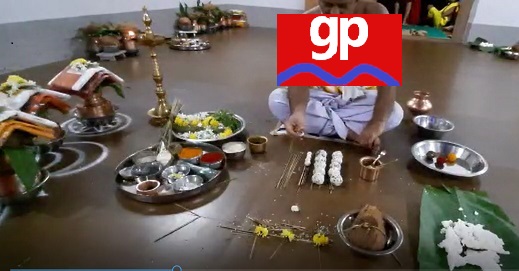Shraddh ceremony FAQ cover questions related to shraddh types and procedure. Know pind pradhan, tarpan, and kriya questions and answers.

Frequently Asked Questions about Shraddh Rituals.
Shraddh is derived from the word shraddha. Shraddha means Faith. Offerings made to our ancestors and especially to our dead parents with complete faith through Brahmins as per the afterlife ritual standards. If not affordable one can perform without Brahmins.
When a person dies he or she leaves the body on the earth planet and sukshma sharir (subtle body) joins Brahamanda. Pind means body. The sukshma sharir’s desire to get its body is fulfilled by pind pradhan, So the deceased person’s son/ daughter or eligible relative offers pind. This pind is made of rice balls and black sesame seeds. Desire to get body and offering of food and fulfilling all types of desires with black til is the importance of pind pradhan.
Pururav-Aardrav and Dhurilochan (Demigods) are the Deities of ancestors’ souls. Supernatural gods related are Vasu-Rudra-Aditya. The purpose of chanting mantras is Vasu for Desire, Rudra for Dissolution, Aditya for Action. The deceased person for whom the ritual of Shraddha is being performed is considered as a follower of Vasu, his parents are considered as followers of Rudra and his grandparents are considered as followers of Aditya. Therefore during Shraddha, the names of pitru, pitha maha, prapita maha (Father, Grand father, Great grandfather), mata, pitha mahi, prapita mahi (mother, grandmother, Great grandmother) are pronounced as representatives of Vasu-Rudra-Aditya respectively.
Tarpana means “satisfying”. In shraddh this is a process of invoking ancestors and pitrus by offering water and sesame seeds. The water being held on the palm and released as per defined afterlife ritual standards. This is a ritual to recognize the importance of the debt one has to Gods, sages, and ancesstors.
Asthi (Diseased Bone) should be collected on the day of cremation or the 3rd/7th /9th day from the cremation day. This collected Asthi should be immersed in a holy pond or flowing water before the 10th day of cremation. However, due to unavoidable circumstances, Asti visarjane not done before the 10th day, keep this outside the home or tie to a tree and perform Asthi visarjane as per the ritual standards on some other day.
Eka in Sanskrit is the numeric digit “one” and Uddistha means “Particualrized”. So Shraddh for one person is called Ekodishta shraddh. Derived from the combination of two words of Sanskrit Eka and Uddishta. This shraddh falls on the eleventh day from the date of death. This shraddh is also referred to r Varshik shraddh/Annual shraddh.
With the performance of Sapindikaran shraddh, the individual attains the title of ‘Pitru’ and gets a place in Pitrulok
Dharmodaka and pind pradhan for first day to 10th day performed on 10th day.
Panchgavya homam performed on 11th day. A mixture of cow’s milk, curd, ghee, cow’s urine and cow dung is sprinkled all over the house. Ekodistha sharddh performed on the 11th day. Vasugan shraddha and Rudragan shraddha also performed on the 11th day
Sapindikaran shraddh performed on 12th day. But as per afterlife ritulas standards this has to be done in 16 times in respective months and Sapindikaran shraddh day before the annual shraddh. Brahaman Bhojana and daan also made on this day.
Inviting everyone on the 13th day for a meal and served with sweets.
Shraddh performed every day by offering water and sesame seeds to our ancestors is called Daily Shraddh.
Performed every year on Hindu death anniversary as per Hindu tithi calendar.
Performed on the specific day with a purpose.
Performed to conceive or problems related to foetus. Normally done in the month of Magha as per the Hindu calendar.
Performed for celebrations, success of events, etc. For example, marriage, birth of a baby etc. This is is also known as Vriddhi shraddha.
Performed at holy places like Gokarna, Gaya etc,.
Performed by offering money to the priests.
Performed by offering food to the priests.
Those people who do not have children or whose children are physically handicap and non-believers in afterlife rituals, they should perform for themselves when they are alive.
It is known as One Time shraddha for those who cannot perform every year, due to various reasons.
Know More:
E-mail: gokarnapuja@gmail.com
Phone: 9663645980 (English/Kannada/Hindi)
Phone: 9448628918 (Hindi/Kannada/Telugu/Marathi/Konkani)
Also see: Online Shraddha at Gokarna
